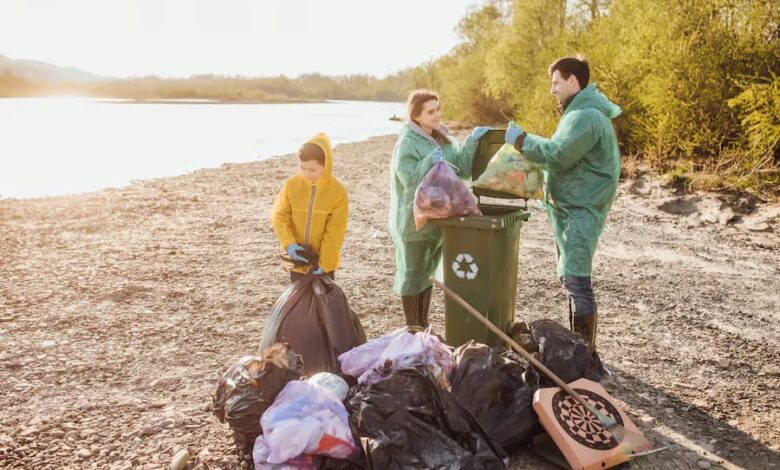The World Has a Waste Management Problem. Here’s How to Fix

One of the most difficult problems of the twenty-first century is waste management. Waste production is steadily increasing as urbanisation and industrialisation continue to expand. According to the most recent World Bank report, solid waste from urban areas is expected to increase by 70% worldwide, with developing countries having the most waste management problems. This post will highlight eight typical issues related to waste management that companies encounter and provide a list of fixes that can revolutionise how businesses operate. An economical and practical way to efficiently manage waste in your community is through cheap local skip hire.
Over 2 billion tons of municipal solid trash are produced worldwide each year, and by 2050, this amount is predicted to rise by 70%. The majority of this increase will originate in developing nations, where problems are made worse by a lack of trustworthy waste collection services, a lack of separation of sources for different types of waste, and a reliance on open dumps as well as unmanaged landfills for destruction, which results in the creation of enormous, poisonous mountains that pollute the air, contamination the water, compromise public health, and accelerate climate change. For instance, over 145,000 tons of trash—one-third of all urban waste—end up in landfills daily.
Using Technology To Close The Distance
Here’s where technology comes into play. How we manage waste is changing significantly due to technological advancements and advanced garbage disposal software. In addition to streamlining waste management procedures, these instruments pave the way for more efficient recycling, reduction, as well as reuse tactics. We’ll examine these methods further as we continue this blog, emphasising how they transform the solid waste management industry.
The Single-Use Plastics Directive Of The EU
The Single-Use Plastic Directive, which was enacted in July 2021, encourages the shift to a circular economy by outlawing the use of plastics that are not recyclable in all EU member states, including straws, balloon sticks, cotton buds, disposable plates, cutlery, and plates. Using Extended Producer Responsibility (EPR) programs, which mandate that packaging manufacturers like wrappers, wipes, and nicotine products pay for the gathering, sorting, and recycling of their products after consumption, the Directive also seeks to reduce the use of specific single-use plastics. The use of containers for food and beverages in catering and food delivery services must also be restricted by member states.
Recycling’s Power
An essential component of efficient waste management is recycling. Recycling minimises the demand for landfill space, lowers the production of greenhouse gases, and conserves natural resources by converting recyclable materials into new goods. With the correct technology and procedures, practically every kind of waste, from plastics and paper materials to electronics, including metals, may be recycled.
Achievements
There are encouraging instances of effective recycling initiatives all across the world. For example, thorough public education, practical collecting methods, and efficient laws have allowed certain European nations to attain impressive recycling rates. Other municipalities looking to improve their recycling operations can use these examples as a guide.
Complying With Compliance Rules
The Issue: garbage management firms have to deal with intricate and constantly evolving laws pertaining to recycling, garbage disposal, and environmental preservation.
The Answer: In this regard, an approach to waste management has been beneficial. When you don’t have the time to accomplish a work well by hand but need to pay attention to all the details, automation is a perfect solution. Waste tracking is an excellent method to guarantee that waste is disposed of properly and quickly and that it can be carried on with business as usual.
SDGs And Waste Management
With an emphasis on research-based planning and circular finance, this project has the potential to serve as a model for larger national initiatives in India and elsewhere that encourage environmentally conscious business at the local level. To determine the current amounts of trash and both official and unknown supplies that will aid in the preparation of successful, implementable policies for circular systems, cities must conduct data inventories and waste characterisation studies.
By environmental laws and policies, the needs and opinions of those who are disproportionately impacted by plastic pollution must be given priority to fulfil the 2030 Agenda for Sustainable Development.
Absence Of Involvement In The Community
There are best practices in the materials management sector. Although the procedures are in place, the government, corporations, and individuals are reluctant to use them. Misinformation, ignorance, and socioeconomic difficulties are the causes of the resistance.
People may wish to continue using their antiquated trash disposal practices because they are adequate and don’t need to be changed. Not in my outdoors; this kind of thinking impedes development and sustains destructive behaviours.
Final Words
It is possible to solve the world’s garbage problem. To raise the conversation, encourage action, and attract greater investment, however, we—the public and private sectors, governments in the first place regulators, investors, international aid organisations, climate campaigners, and civil society—must unite.
Visit Usaweeklytime for more informative blogs.





